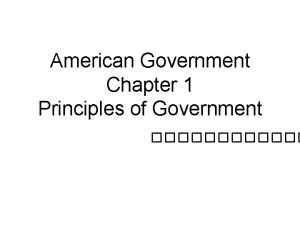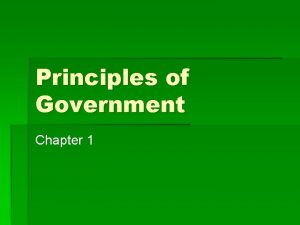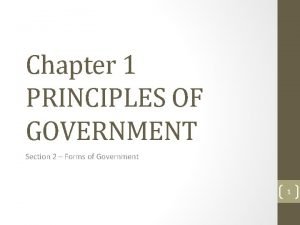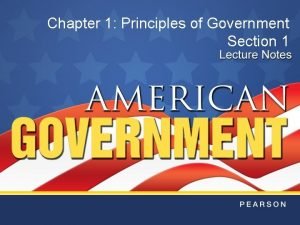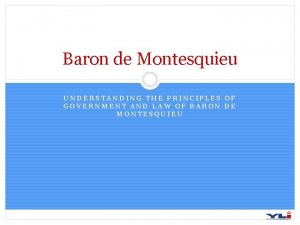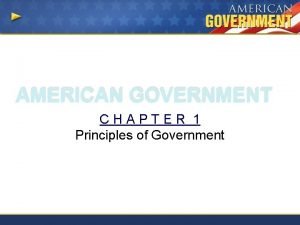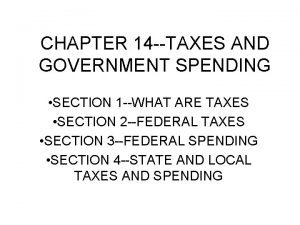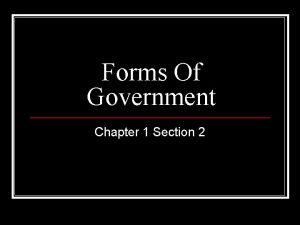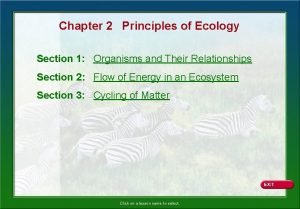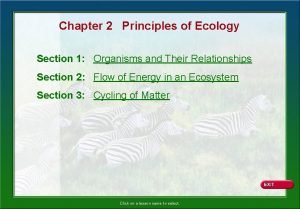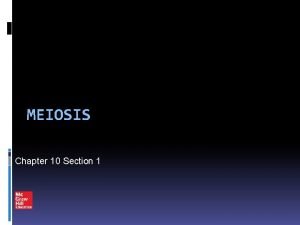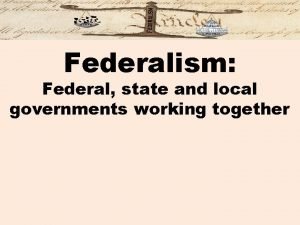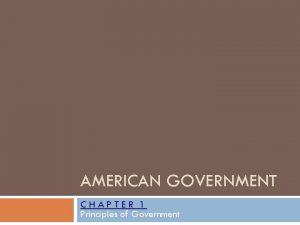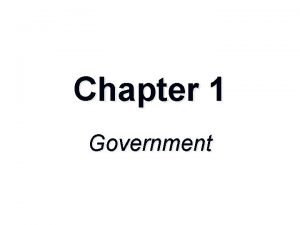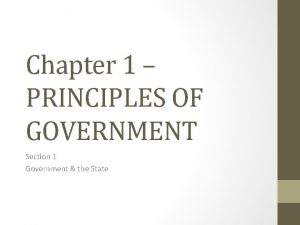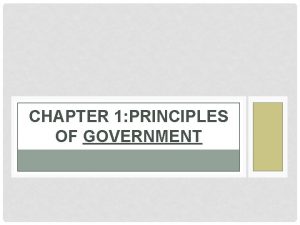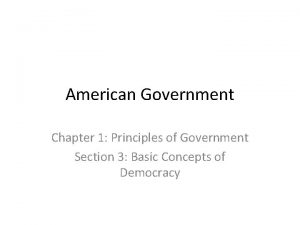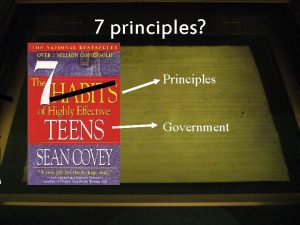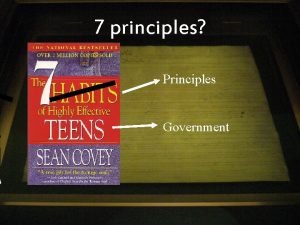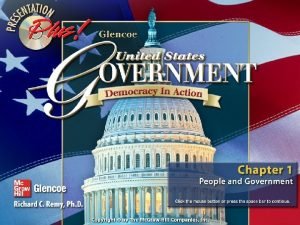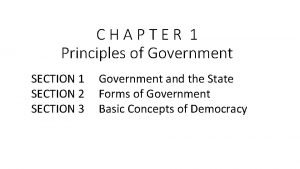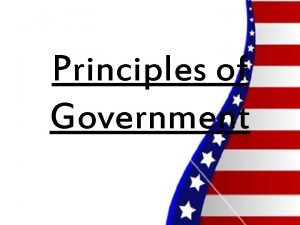Principles of Government Chapter 1 Section 1 Government














- Slides: 14

Principles of Government Chapter 1 Section 1

Government & It’s Purpose: �Government: The institutions, people and processes by which a nationstate or political unit is ruled and its public policy created and administered

Government & It’s Purpose: �Nation-State: A political unit with a defined territory, organized under a government and having the authority to make and enforce the law �Territory: Land �Population: People �Sovereignty: Authority to make decisions �Government: People with the authority to rule �Politics: The methods or tactics involved in managing government and gaining power

You to can be a King The Principality of Sealand All you need is about a billion dollars

Government & It’s Purpose �Government has 5 main purposes: �Protection: Provide protection for its citizens from threats abroad �Maintenance of Public Order: Protecting citizens from violence from within �Resolution of Social Conflicts: Serves as mediator when disputes arise between groups �Responsibility for a Stable Economy: Keep the money flowing �Provision of Public Services: Provide basic needs and care for those who are in need

Origins of Government: �Evolution Theory: Sees government as an extension of the family (parents have power over the children) �Families came together to form tribes (elders in charge) � Force Theory: Governments formed as a result of one � group’s conquest of another � Victorious group would impose its rules on the conquered group

�Divine Right Theory: Rulers divine their authority directly from god �Defiance of rulers is defiance of god himself

Origins of Government: �Social Contract Theory: The governed and those governing have obligations to each other, the people being governed will support the government and the government will protect the basic rights of the people �Idea made popular by 17 th and 18 th Century philosophers, including John Locke, James Harrington, Thomas Hobbes and Jean Jacques Rousseau

Power & Forms of Government: �Power generally held by only a few people �Elites: A small and privileged group who have a disproportionate share of money or political influence �Marxist Theory: Those who control the economy have the real power, government is a tool of the rich �Power Elite: Important policies made by three groups, corporate, military and political leaders �The Bureaucrats: Elites are not well-known, are the people behind the scenes who carry out day-to-day operations of government �The Pluralists: No single group has complete control of money, power or prestige; power split between many types of elites

All Governments can be classified by… � 1. Who can participate in the governing process. � 2. The geographic distribution of governmental power within the state. � 3. The relationship between the legislative and executive branches of government.

Rule by… �Rule by many (Democracy): �Democracy: Government by the people, exercised either directly or through elected representatives �Direct/Participatory Democracy: Democratic system in which all citizens participate in politics and decisionmaking �Representative Democracy: Democratic system in which policies are made by officials accountable to the people who elect them

Rule by… �Rule by one (Autocracy): �Absolute Monarchy: Ruler gains power through inheritance �Dictatorship: Absolute ruler controls all power, usually by fear or force, ignores the will of the people �Rule by few (Oligarchy): �Aristocracy: “Rule by the finest, ” power determined by social status, wealth or level of education �Theocracy: Power to rule lies in the hands of religious groups �Political Party: Control of all power by one political party

Forms of Government: �Unitary System: Form of government where all the powers of government are held by a single unit or agency �Rules applied equally to all, avoids costly duplications �Examples include France, Japan, Denmark, Great Britain �Federal System: From of government where powers are divided between a central authority and a number of regional political subdivisions �Powers are separate but overlapping �Confederations: Political system in which a weak central government has limited authority & the states have ultimate power �Loose grouping of independent states

Forms of Government: �Parliamentary Government: The executive leaders are chosen by and responsible to the legislature �Chief executive is Prime Minister or Premier and is a member of the legislature (as are the members of his/her cabinet) � Not popularly elected, but heads the majority party or coalition of parties �Presidential Government: The legislative and executive branches are separate & function independently �Chief executive is the president, popularly elected �Both groups balance & check one another �President is totally separate from the legislative branch
 Principles of government chapter 1 answers
Principles of government chapter 1 answers Principles of government chapter 1
Principles of government chapter 1 Forms of government chapter 1 section 2
Forms of government chapter 1 section 2 Chapter 1 principles of government
Chapter 1 principles of government Chapter 1 section 1 government and the state
Chapter 1 section 1 government and the state Chapter 1 principles of government study guide answer key
Chapter 1 principles of government study guide answer key Chapter 1 principles of government
Chapter 1 principles of government Chapter 14: taxes and government spending section 1
Chapter 14: taxes and government spending section 1 Chapter 1 section 2 forms of government
Chapter 1 section 2 forms of government Principles of ecology chapter 2 section 3 answer key
Principles of ecology chapter 2 section 3 answer key Chapter 2 principles of ecology answers
Chapter 2 principles of ecology answers Section 1 organisms and their relationships
Section 1 organisms and their relationships Principles of ecology chapter 2 section 1 answer key
Principles of ecology chapter 2 section 1 answer key Chapter 10 section 1 meiosis
Chapter 10 section 1 meiosis What are the three levels of government
What are the three levels of government
